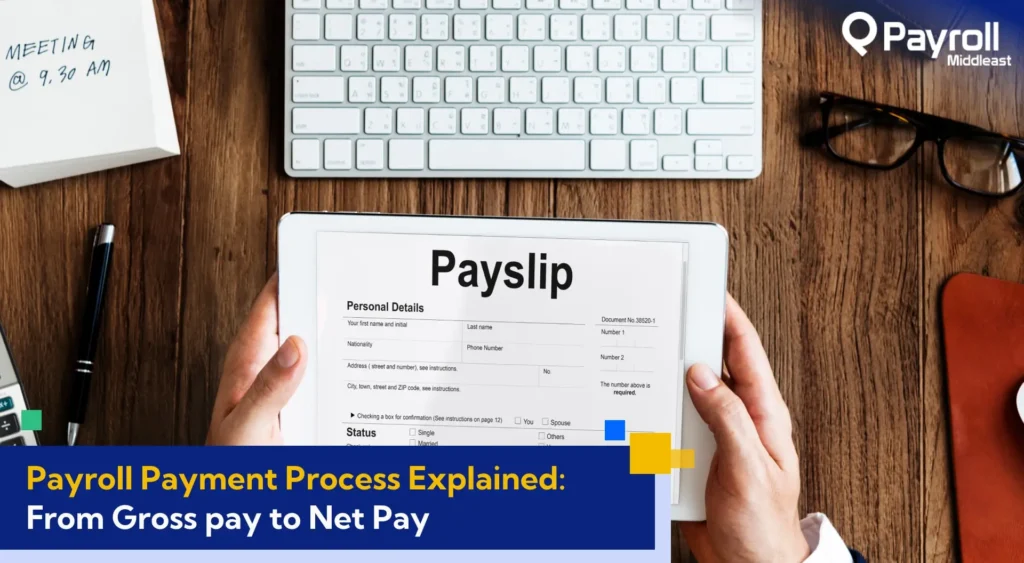Payroll is a critical aspect of business operations. It means ensuring staff members are paid accurately and according to their time and effort. A trustworthy and precise payroll process cultivates trust and retains employees while eliminating the risk of legal consequences. But how does the payroll payment process in UAE? This is an important question especially if you are the resident of UAE and Saudi Arabia. In this blog post, we will take a look at the process of payroll payments from gross to net salary, touching on points that include Leave salary calculation in UAE, Payroll card balance check and minimum wage in Saudi Arabia.
What is Payroll Accounting?
Payroll accounting is essentially the calculation, management, recording, and analysis of employees’ compensation. In addition, payroll accounting also includes reconciling for benefits, and withholding taxes and deductions related to compensation. The calculation of payroll is highly influenced by each country’s legal requirements (it may also depend on state or local city requirements).
Components of Payroll management in the UAE
Payroll management in the UAE involves some essential components, such as:
-
Adhering to UAE labor laws
The UAE labor laws mentions that employees and employers should dictate the legal requirements, the rights and responsibilities for matters such as wages, leave entitlement, and working hours. Understanding these laws is a critical aspect of payroll management in the UAE.
-
Persistent WPS payments
UAE introduces the beach protection system to protect employees’ wages and ensure payments are timely. Under WPS businesses are required to pay their employees to UAE central bank growth financial institutions. This system helps to maintain transparency and also accountability in the payroll process in UAE.
-
Understanding the role of free zones
The UAE has numerous free zones which are designated economic areas offering incentives to the businesses such as simplified registration processes and tax exemptions. These free zones often have their own regulations concerning payroll and employment. Which businesses must take into account when managing payroll.
-
Navigating the absence of income tax
The UAE does not impose any personal income tax on employee salaries. However, businesses must be mindful of other tax-related obligations such as corporate tax and value-added tax in certain emirates.
What Steps are Involved in Processing Payroll Payments?
The methods employed to establish and disburse employees’ wages are known as the payroll payment process. There are multiple steps involved. These steps include determining an employee’s gross income, subtracting any necessary deductions, calculating the net income, and ensuring the employee gets the payment. This is really helpful in ensuring a timely and accurate reimbursement, companies must adhere to strict payroll management regulations, especially in regions such as the United Arab Emirates.
The process of salary payment in the United Arab Emirates is quite straightforward, yet it requires attention to detail. For example, businesses must keep a record of all payment compensations, and accurate leave wage computation is essential for complying with labor regulations in the United Arab Emirates.
Step 1: Gross Pay Calculation
Gross pay is the total salary before deductions. It encompasses the basic income/revenue, overtime, extra allowance, and bonus. We can take an instance by understanding this: an employee in the UAE with a base salary of AED 5,000, AED 500 in overtime, and AED 1,000 in bonuses would have a gross pay of AED 6,500.
An Accurate gross pay calculation is very essential and necessary, as it forms the basis for other payroll elements, such as leave salary calculation in UAE.
Step 2: Deductions from Gross Pay
Deductions are subtracted from gross pay and fall into two categories:
Statutory Deductions: These are legally required, such as social security or national insurance (in the UAE and Saudi Arabia).
Voluntary Deductions: These are optional, like insurance premiums or loan repayments. In the UAE, payroll card fees may also apply.
Step 3: Net Pay Calculation
Net pay is the amount an employee takes home after all deductions. This is the final figure deposited into a bank account or payroll card. Correct calculation of net pay is essential to avoid underpayment or overpayment.
Step 4: Payroll Payment Methods
Payment can be made via:
- Direct Bank Transfer: The most common method.
- Payroll Cards: Prepaid cards for easy wage access in the UAE.
- Cash or Cheques: Less common today but still in use.
- Using digital methods like bank transfers or payroll cards streamlines the process and reduces costs.
Step 5: Issuing Pay Stubs
Employers are typically required to provide pay stubs detailing gross pay, deductions, and net pay. These serve as proof of income and help resolve any salary disputes. Accurate pay stub issuance is crucial for transparency in the UAE and Saudi Arabia.
Additional Considerations and thought abouts in Payroll Payment Process
-
The first one is Leave Salary Calculation in UAE:
In the UAE, leave salary is based on an employee’s gross pay. It is mainly counted by using the average salary from the prior 12 months. Employers must follow UAE labor laws. This is to ensure that employees receive proper leave compensation.
-
2nd one is payroll card check balance:
Payroll cards allow employees to access their wages easily. It also works even without a bank account. It has several benefits which includes the payment of payroll and card balance, via mobile apps or ATMs. This helps employees in managing their finances better.
-
3rd one is Non Renewal of Contract Email to Employer:
Employees must notify their employers via email if they do not wish to renew their contract. The employer must ensure that final payroll payments, including leave salary or end-of-service benefits, are processed correctly.
-
Last one is Minimum Wage in Saudi Arabia:
Saudi Arabia has implemented a Minimum Wage in Saudi Arabia law, ensuring that employers must pay their employees at least the mandated minimum salary. This regulation promotes fair wages and labor rights. Non-compliance can lead to legal complications, including hefty penalties and potential legal consequences for employers.
What tasks are related to Payroll Processing?
Building a solid HR steam is essential for your business that handles your payroll process. You must hire the best local specialist that can help you with your payroll. Managing on UAE payroll involves dealing with the whole process of paying all ten players of your company. Also involves that they get correct payments and receive them in time.
Here is the processing of the task for small businesses have to cover:
- Keep track of your employee’s work hours
- Calculation of payments
- Preparing and issuing payslips
- Consider paid leave
- Calculating taxes
There are many payroll functions that you can handle. You must also learn about the following steps to keep your payroll in compliance:
- Banking
- Employment law
- Working week
- Tax and social security
- Voluntary and mandatory deductions
To sum it up, the payroll payment process is a detailed and essential function within any organization and In Payroll Middle East we understand it very well. This is why we are here to help your business succeed. We can assist you with your payroll to stay in compliance. This will help you to focus on your core activities while we handle your administrative tasks.
We will provide you with a customized solution that will solve your needs. Our team of professionals is readily available to help you process your payroll faster. With our dedicated experts, you can be completely sure that your payroll is going to be accurate.








Self-Appraisal Comments by Employee: Example